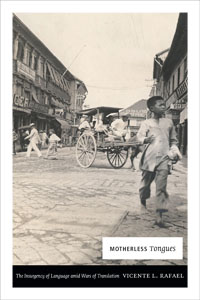Motherless Tongues: The Insurgency of Language amid Wars of Translation
 Author(s): Vicente L. Rafael
Author(s): Vicente L. Rafael
Published: 2016, Duke University Press
Cloth: $89.95 – 978-0-8223-6058-2
Paperback: $24.95 – 978-0-8223-6074-2
Description
In Motherless Tongues, Vicente L. Rafael examines the vexed relationship between language and history gleaned from the workings of translation in the Philippines, the United States, and beyond. Moving across a range of colonial and postcolonial settings, he demonstrates translation’s agency in the making and understanding of events. These include nationalist efforts to vernacularize politics, U.S. projects to weaponize languages in wartime, and autobiographical attempts by area studies scholars to translate the otherness of their lives amid the Cold War. In all cases, translation is at war with itself, generating divergent effects. It deploys as well as distorts American English in counterinsurgency and colonial education, for example, just as it re-articulates European notions of sovereignty among Filipino revolutionaries in the nineteenth century and spurs the circulation of text messages in a civilian-driven coup in the twenty-first. Along the way, Rafael delineates the untranslatable that inheres in every act of translation, asking about the politics and ethics of uneven linguistic and semiotic exchanges. Mapping those moments where translation and historical imagination give rise to one another, Motherless Tongues shows how translation, in unleashing the insurgency of language, simultaneously sustains and subverts regimes of knowledge and relations of power.
Vicente L. Rafael is Professor of History at the University of Washington. His books include The Promise of the Foreign, White Love and Other Events in Filipino History, and Contracting Colonialism, all also published by Duke University Press.
Table of Contents
-
Acknowledgments
Introduction. The Aporia of Translation
Part I. Vernacularizing the Political
1. Welcoming What Comes: Translating Sovereignty in the Revolutionary Philippines
2. Wars of Translation: American English, Colonial Schooling,and Tagalog Slang
3. The Cell Phone and the Crowd: Messianic Politics in the EDSA II Uprising
Part II. Weaponizing Babel
4. Translation, American English, and the National Insecurities of Empire
5. Targeting Translation: Counterinsurgency and the Weaponization of Language
Part III. Translating Lives
6. The Accidents of Area Studies: Benedict Anderson and Arjun Appadurai
7. Contracting Nostalgia: On Renato Rosaldo
8. Language, History, and Autobiograhy: Becoming Reynaldo Ileto
9. Interview: Translation Speaks with Vicente Rafael
Notes
Bibliography
Index